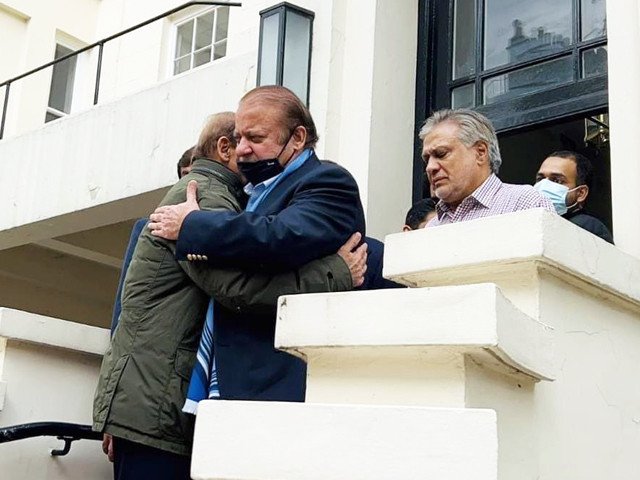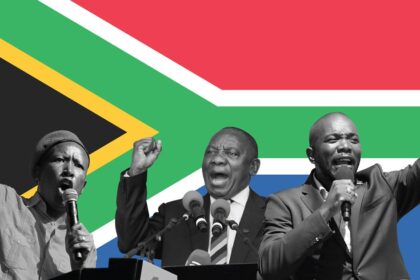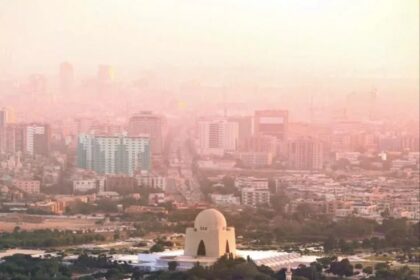London has always been good at playing pretend. A queen who reigned over half the world but paid rent on her crown. A city that held revolutions over tea and diplomacy over curry. So perhaps it’s no great shock, then, that for decades London has doubled, in many ways, as the other Islamabad — a sanctuary for Pakistan’s political misfits, deposed kings, and, now and then, a TikTok crusader with a Wi-Fi connection and a mic that won’t drop.
This is not a punishment exile. This is exile as a strategy. You can squint so hard at it, in the midst of Park Lane, that maybe you think it’s policy.
Pakistani politicians don’t merely flee to London; they thrive there. Altaf Hussain thundered his MQM monologues out of a small, shabby office in North London for over two decades, his voice reverberating over phone lines like a spirit haunting Karachi’s neon-lit airwaves. Nawaz Sharif made exile a lifestyle brand: he wore snazzier suits, his talk grew blander, and any “container” in sight was one full of designer furniture.
In London, they could have what Pakistan never could give them: uninterrupted electricity, jovial journalists, and, most importantly, plausible deniability. It gave them a throne with no court, a stage with no state. And ironically, it presented them with a more captive audience than many in Lahore.
But then exile, like everything else in Pakistan, has a VIP section. For every three-time prime minister sipping afternoon tea in Mayfair, there is an activist gone missing between Quetta and nowhere. For each TikTok dissident flaunting from the comfort of Wembley, there is a Baloch student gagged without fanfare. This is not the exile of revolutionaries; it is the migration of the elites. Exile is no longer quite so much an affliction — more a finicky boutique service.
Medical visa? Check. Media team? Check. Swiss bank account still unthawed? Checkmate. The question becomes: who gets to be an exile, and who simply disappears into oblivion?
It also raises the question: why do the political exiles of this country always make London their headquarters? If not Istanbul or Kuala Lumpur, then perhaps Toronto? The answer may be found in the lingering echoes of empire. London feels familiar. The tea tastes the same. And the posh accents require no subtitles. Somehow, the old colonial capital persists as the most welcoming foster parent to the post-colonial ruling class. When bedlam breaks out at home, the global giants don’t look East — they look to the historical coloniser that taught them how to rule.
And so the drama goes on: Lahore is for rallies. London is for regroups.
The phenomenon isn’t new either. From Zulfikar Ali Bhutto’s bonus runs at Christ Church, Oxford, to Fatima Jinnah’s strolls through the quiet of Hyde Park, London has long been the political confession box of Pakistan’s privileged. Here, fallen bigwigs rebrand themselves, redefine their misdeeds, and — with the help of the right PR mechanic — launder scandals as durable as asbestos in the wash cycle of public amnesia. A couple of overpriced op-eds, a few shots with the diaspora donors, a quaintly timed visit to your doctor’s, and voilà: you’ve got yourself a round-robin on a British postcode.
One of the strangest gravitational pulls is watching a politician turn into a myth while living in exile. Distance sanitises. The sins blur. Memory airbrushes corruption, coups, or crackdowns from history, draping nostalgia in the soft shawl of nationalism.
However, there’s another enabler: the diaspora. From drawing rooms in Edgware to Instagram Lives in Ilford, a feedback loop keeps the myth alive. Diasporic forums — from TikTok to YouTube to think-tank panels — frequently transform exile into a rebranding opportunity. The exiles transition from fugitives to misunderstood visionaries. And in that warm wave of curated nostalgia, accountability fades away.
The strength of the diaspora, however, is not just financial; it’s emotional. The aching homesickness of diaspora communities is built on a romanticised memory of a homeland turned into the sludge of bureaucracy, hyperinflation, and 20-minute load shedding. For many of those living abroad, these leaders in exile are nostalgic placeholders for a Pakistan that was never, yet perhaps, one election away.
The tragedy? While the diaspora dreams in rose-tinted Urdu, the real citizens back home are choking on tear gas and unemployment.
Maybe that’s why so many political scripts feel like reruns. Leaders fly in, get arrested, deliver a fiery speech, and — depending on the establishment’s weather forecast for the coming week — are either disqualified, re-elected, or flown back to London for “urgent angioplasty”. It’s not just theatre. It’s a five-year visa theatre with a Michelin-starred intermission.
But in exile, it’s not so much a second act as it is the only act. And when staged from afar, it blurs into abstraction. You’re talking to a memory of the nation, not lived experience. You become the president of a country you don’t recognise. You become louder as you become more inconsequential.
While all this is brewing, a strange paradox emerges. Exile often gives you clarity — not accountability. You can criticise to your heart’s content because you’re no longer in the muck and mire of actual governance. But you lose intimacy with the people you claim to represent. The press releases turn into echo chambers. The selfies become sermons. The rebellion… is retweeted.
We, however, are addicted to the myth of return. All exiles dream of their triumphant comeback. The folks dream about redemption. The power brokers prepare for selective amnesia.
But the real tragedy? Not all get curtain calls. Some die anonymously overseas. Others fade into obscurity. Many don’t leave digital breadcrumbs in the first place. Their exile is not live-streamed; it is lived in refugee camps, on blocklists, and in silence. To them, there is no audience — only absence.
One has to ask: if exile was once an emblem of resistance, has it now become a career move? It’s the most stable portfolio you can construct in Pakistani politics, in a perverse sense — all risk, no responsibility; all relevance, no reality.
Perhaps no grimmer irony exists than this: exile, intended as a temporary state, is addictive. It is clarity without consequence, leadership without logistics, and nostalgia without noise. And eventually, the vow of return ceases to be an intention — and becomes a performance. Perhaps that is why exile has become the safest job in Pakistani politics:
No rallies to juggle.
No courthouse to avoid.
No load shedding to endure.
Nothing but a Dunkin’ loyalty card and a VPN.
Indeed, in a nation where power moves like dunes in a desert storm, sometimes the most stable seat in the house is in exile — where the chai is overpriced, the tabloids are vicious, but the silence… is golden.
















